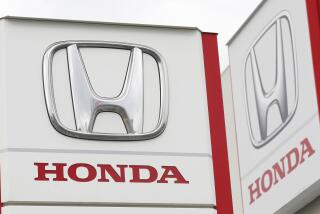Civic Slump Puts a Dent in Honda’s Armor
- Share via
Superman isn’t supposed to catch colds, gamblers aren’t supposed to beat the house in Las Vegas and Honda’s car sales aren’t supposed to slump.
But for the last two years, largely because of the softening popularity of its aging Civic compact sedan, Honda Motor Co.’s passenger car sales in the U.S. have dropped, falling 8.8% since hitting an all-time high in 2001.
Last year, sales of the company’s Honda and Acura brand passenger cars were off a combined 3.2%, after falling 6.8% in 2002.
Honda Motor is not facing doom and gloom, though. Its total passenger vehicle sales for 2003 rose an impressive 8.2%, thanks to its popular Pilot SUV and its upscale Acura MDX sibling, the refrigerator-box-shaped Element “urban utility” vehicle and the Odyssey minivan.
The company is simply caught in a shrinking passenger car market as consumers continue shifting to pickups, minivans, SUVs and wagon-like crossover vehicles that are flooding the market.
“The market is moving away from the passenger cars that have been Honda’s strength,” said George Peterson, president of AutoPacific Inc., a market research firm in Tustin.
Meanwhile, most of Honda’s competitors -- including DaimlerChrysler’s Chrysler Group, Ford Motor Co., General Motors Corp. and Japanese rivals Nissan Motor Co., Mitsubishi Motors Corp. and Mazda Motor Corp. -- all are launching new passenger car models. Their hope is to recapture customers who don’t want trucks and haven’t had much except Honda and Toyota offerings to look at in recent years.
“It is getting tougher out there and we fully expect Honda to lose some market share in 2004” because of the increased competition, said Art Spinella, president of CNW Marketing Research in Bandon, Ore.
Honda’s reputation for well-built passenger cars, and the longtime popularity of its Civic and larger Accord models, have made it a key target. “Everyone’s gunning for them,” Spinella said.
The modest slump in Honda car sales is a wake-up call for executives.
Faced with the unwelcome possibility of a third consecutive year of declining car sales, Honda finds itself needing to increase its U.S. marketing budget, including incentives, to help its dealers move their stock.
“We’re trying to prime the pump,” said Thomas Elliott, executive vice president for automotive operations at Torrance-based American Honda Motor Co., the Japanese automaker’s U.S. sales arm.
Honda has never offered direct consumer rebates although it occasionally provides cash incentives to dealers, who can use the money in customer negotiations.
Elliott says consumer rebates are still forbidden. But Honda is offering dealers $400 to $800 for each Civic they sell. Additionally, Honda offers low interest rates and lease terms in some areas and will boost its regional advertising budget by 40% in the first quarter, Elliott said.
Civic sales have weakened in part because the car, although receiving cosmetic and equipment updates each year, is based on a platform introduced in 2000. Analysts say the Civic is showing its age; the compact’s sales in 2003 were down 9.7% from 2001. The next all-new Civic, with state-of-the-art engineering and a redesigned exterior, isn’t expected until late next year.
Meanwhile, the Honda Accord, one of the best-selling cars in the country, saw its sales slip by 3.8% in 2002. But the Accord was redesigned for the 2003 model year. The roomier, faster and sleeker sedan’s sales stabilized last year, falling by just 1,230 units -- a strong showing in a market that saw combined total passenger car sales fall by 471,000 units.
Industrywide, sales of 19 of the 36 car brands dropped last year as buyers kept migrating to SUVs and pickups.
Honda has also been slow to enter the pickup market. This month, Honda announced it would introduce its first pickup for the 2006 model year.
The truck, with a short bed and large four-door passenger cabin, will be built on a car-like platform and will stress passenger comfort over utility. And it will mark Honda’s acceptance of the shifting marketplace.
Still, Honda isn’t giving up on cars.
“There’s no question that the Civic and Accord are very, very important to Honda,” Elliott said. “There’s more competition, though, [and] we are looking at a lot of other categories” to expand passenger car offerings.
Honda is likely to introduce subcompacts, hatchbacks and other car styles in coming years, he said.
The only new car model this year, though, will be a hybrid gas-electric version of the Accord, to complement the Civic hybrid that was introduced two years ago.
Despite Honda’s dip in car sales, analysts say the company remains in good shape.
“Honda still has one of the highest levels of shopper consideration in the industry,” said Dan Gorrell, vice president of Strategic Vision, a San Diego-based automotive market research firm. “It’s just a matter of them getting the right products out to the people. And they’ve proven they can do that.”






